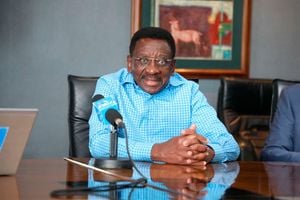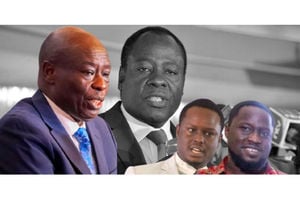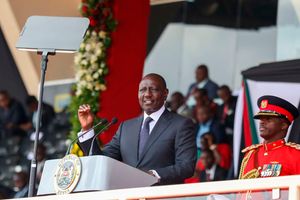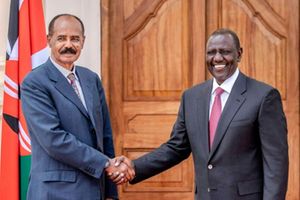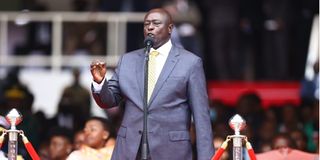
DP Rigathi Gachagua at Kasarani International Stadium, Nairobi, on September 13, 2022.
Embattled Deputy President Rigathi Gachagua could be out of office on Friday if the Senate confirms the 11 charges against him- setting off a process to find his replacement barring a court order suspending his ouster.
If senators vote to impeach him, Senate Speaker Amason Kingi will gazette the decision, announcing a vacancy in the office of the DP.
At this point, Mr Gachagua is expected to challenge his ouster in court in a protracted legal battle hoping to derail the process to appoint his replacement.
This is because his impeachment by the Senate will kick in Article 149 of the Constitution on the vacancy in the office of the Deputy President.
It states: “Within 14 days after a vacancy in the office of Deputy President arises, the President shall nominate a person to fill the vacancy and the National Assembly shall vote on the nomination within 60 days after receiving it.”
The National Assembly has moved swiftly to convene a special sitting on Friday to consider “priority business” largely expected to be the receipt of President Ruto’s nominee for the office of Deputy President.
Although the drafters of the Constitution anchored public participation as a cornerstone of landmark developments, they did not factor it in the process of clearing of a DP nominee. Neither is the role of the electoral commission in clearing candidates for election spelt out specifically in this scenario.
“Unfortunately, the qualification of the DP nominee will be considered by the Members of the National Assembly as they take a vote,” disclosed former National Assembly Speaker Justin Muturi.
The Public Service Cabinet Secretary (CS) notes that Article 147 of the Constitution is unique as opposed to other Articles on the nomination, approval and appointment of State officers.
Legal lacuna
This scenario exposes the legal lacuna in the Article that required subsidiary legislation to give the legal framework in the impeachment process of a DP.
According to legal experts, the law is silent and gives the President and Parliament absolute powers to fast-track the replacement process, excluding the Independent Electoral and Boundaries Commission (IEBC) and the requirement for public participation.
Contrary to the nomination, approval and appointment of State officers such as the CSs, Principal Secretaries, Attorney General (AG) and the Director of Public Prosecutions (DPP), among others, Members of the National Assembly are only mandated to debate and vote on the DP nominee.
Articles 132, 152, 154, 155, 156, and 157 are very clear on the replacement or appointment process of state officers.
Article 132 of the Constitution on the functions of the President, provides that: “The President shall nominate and, with the approval of the National Assembly, appoint, and may dismiss --the CSs, in accordance with Article 152, the AG, in accordance with Article 156, the Secretary to the Cabinet in accordance with Article 154, Principal Secretaries (PSs) in accordance with Article 155; high commissioners, ambassadors and diplomatic and consular representatives and in accordance with this Constitution, any other State or public officer whom this Constitution requires or empowers the President to appoint or dismiss.”
Equally Article 157 of the constitution on the Director Public Prosecutions (DPP) provides for the nomination and, with the approval of the National Assembly, appointment by the President as well as the qualifications for appointment. Similar procedures apply to a judge of the High Court among others.
“Under the Constitution, the president can name a new deputy one minute after the Senate decision and Parliament approves within a day without public participation,” argued a Kenya Kwanza MP who declined to be named.
The President is thereafter at liberty to nominate his preferred replacement, as the scramble for the seat gets traction, especially from the mountain region.
But Constitutional lawyer Waikwa Wanyoike argues that IEBC commissioners must be in office before a new DP is nominated to satisfy the requirement in the Elections law on clearance of candidates after assessing their suitability, including meeting minimum qualifications.
He states that the electoral body plays a key role as the constitution assigns it the technical competency of elective officers and the law is heavy on systems of checks and balances.
He argues that the law must be read in a holistic manner.
“Decision on whether a person proposed by the president to be a nominee for the position is qualified to be considered for DP must be undertaken by the IEBC,” Mr Wanyoike stresses.
Lawyer Duncan Ojwang’ also argues that the interpretation of the law is that the President nominates the individual and sends the name to Parliament.
“Interpretation of the Constitution begins from the text and does not become the text, the Constitution provides that the President sends his nominees to Parliament who is free to contact anybody for vetting report, including IEBC of they need,” he says.
The various scenarios playing out, coupled with the National Assembly motion on the alteration of its calendar for a special sitting on Friday, suggest the political wheel is spinning faster and Mr Gachagua could be a man running out of time.
If the DP loses the Senate vote, it could seal his short two-year stint in office.
Should he succeed in persuading senators, he could be exonerated and thereby have the last laugh after the special motion by Kibwezi West MP Mwengi Mutuse was overwhelmingly supported by the National Assembly delivering him to the Senate for trial.
The grounds for removal of the DP as stipulated in Article 150 of the Constitution by way of impeachment, which Mr Gachagua is battling, are gross violation of a provision of this Constitution or any other law, where there are serious reasons to believe that the Deputy President has committed a crime under national or international law or for gross misconduct.
The DP is fighting off claims of graft and economic crimes allegations, especially questionable Sh5.2billion purportedly earned in two years in office, abuse of office, divisive statement particularly in his shareholding remarks, breach of secrecy Act in his claims against the National Intelligence Service (NIS) Director-General Noordin Haji on his competence and disowning cabinet resolutions on Finance Bill, 2024 among others.
Article 145 of the Constitution on the removal of the President, with necessary modifications, will apply in the DP’s case.
“If at least two-thirds of all the members of the Senate vote to uphold any impeachment charge, the (Deputy)President shall cease to hold office,” it states.
In this case, if 45 of the 67 senators vote on any of the charges, the DP will stand dismissed from office in accordance with the rules and procedure prescribed under the Second Schedule of the Standing orders.
Similarly, if the senators fail to uphold any of the charges, the matter rests there.
But in case Mr Gachagua is ousted, and the National Assembly votes to endorse President Ruto’s nominee for deputy president, the new appointee will be gazetted and a swearing-in ceremony led by the registrar of the Judiciary done by the Chief Justice.
The new nominee as per Article 148 of the Constitution shall be deemed “to have served a full term as Deputy President if, at the date on which the person assumed office, more than two and a half years remain before the date of the next regularly scheduled election under Article 136 or not to have served a term of office as Deputy President, in any other case.”

